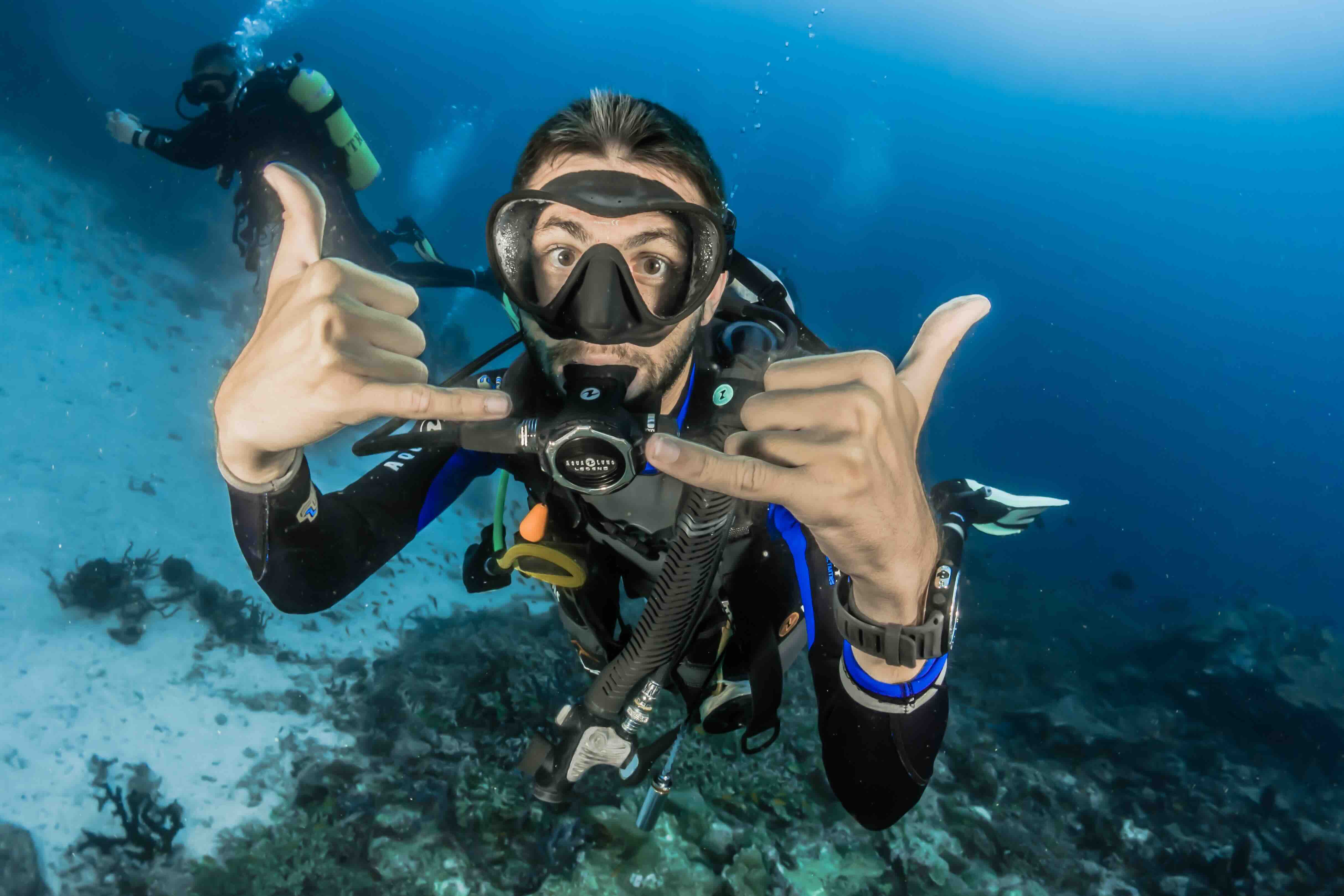Scuba dreamin' on such a winter's day
Since I'm terrified of being masked and submerged for extended periods, my water activity typically consists of snorkeling in shallow bays near shore but I hope to one day get up the courage to take my first dive. The underwater world promises an experience unlike any other full of adventure and serenity.

Whether you're planning your first or fiftieth dive, here are some of the world’s most famous and beginner-friendly scuba diving destinations to inspire your next trip:
1. The Great Barrier Reef, Australia: The Great Barrier Reef is an iconic diving destination, perfect for beginners. With its warm, clear waters and abundant marine life, it’s a diver's paradise. The reef is home to a kaleidoscope of coral and fish species, providing an ideal and gentle introduction to the underwater world.
2. Roatán, Honduras: This Caribbean gem offers crystal-clear waters and a mesmerizing array of sea life. The shallow dive sites and minimal currents make Roatán an excellent choice for novices. With its affordable dive packages, it's also a great option for those looking to dive on a budget.
3. Koh Tao, Thailand: Known as the ‘turtle island’, Koh Tao is famous for its easy dive sites and vibrant marine biodiversity. The island’s calm and shallow bays are perfect for beginners, and there’s a high chance of encountering sea turtles, making for an unforgettable first dive.
4. Bonaire, Caribbean Netherlands: Bonaire is renowned for its accessible shore dives and exceptionally clear waters, ideal for beginners. The island's protected marine park ensures healthy coral reefs and a rich assortment of marine life, providing an excellent environment for new divers to explore.
5. Maui, Hawaii: The island of Maui is a dream for novice divers, with its diverse marine life and stunning underwater topography. Molokini Crater, in particular, offers sheltered and calm waters, teeming with colorful fish, making it a safe and enchanting spot for your first dive.
Booking Your Dive Trip:
Several websites offer dive travel packages tailored to beginners including:
-
PADI Travel: As the world's leading scuba diver training organization, PADI offers a dedicated travel platform. You can find beginner-friendly dive packages and courses in multiple destinations worldwide.
-
Divebooker.com: This website specializes in dive travel, offering a wide selection of travel packages and courses suitable for beginners and allows easy comparison of different diving locations and prices.
-
Bluewater Dive Travel: Catering to both novice and experienced divers, Bluewater offers curated dive trips with expert guides. Their focus on quality and safety makes them a great choice.
Preparing for Your First Dive:
Before embarking on your underwater journey, it’s smart to be well-prepared. Here are some things to consider before your first dive, ensuring a safe and enjoyable experience:
1. Choose a Reputable Dive School: Your safety and learning experience depend largely on your instructor's expertise. Opt for a certified and experienced dive school or instructor, preferably affiliated with recognized organizations like PADI or NAUI.
2. Health and Fitness: Scuba diving can be a physically demanding activity. Ensure you are in good health, and if you have any medical conditions, consult a doctor beforehand. Fitness is essential, but you don’t need to be an athlete to dive.
3. Understanding the Basics: Familiarize yourself with basic diving principles and techniques through introductory courses. Understanding how to use the equipment, managing buoyancy, and learning about pressure changes are crucial.
4. Breathing Techniques: Learning proper breathing techniques is vital. Unlike on land, divers should breathe slowly and deeply to conserve air and control buoyancy.
5. Equalizing Pressure: As you descend, pressure increases. It’s important to learn how to equalize pressure in your ears and mask to avoid discomfort.
6. Communication Underwater: Underwater, you can't speak, so divers use hand signals. Learn the basic signals for communication with your instructor and dive buddy.
7. Respect for Marine Life and Environment: Underwater ecosystems are delicate. Learn about and practice responsible diving etiquette, like not touching or disturbing marine life and being mindful of your fins to avoid damaging coral.
8. Dealing with Anxiety: It’s natural to feel anxious before your first dive. Breathing exercises and open communication with your instructor can help alleviate anxiety. Remember, it’s okay to go at your own pace.
9. Equipment Familiarization Before diving, get familiar with the scuba gear. This includes the mask, snorkel, fins, regulator, buoyancy control device (BCD), and wetsuit. Knowing how to use these properly enhances safety and confidence.
10. Practice Makes Perfect: Most beginner courses include practice sessions in a pool or shallow water. Take advantage of these to get comfortable with the gear and the feeling of being underwater.
Finally, a good friend added that you shouldn't dive the day before flying home from your vacation. The general rule recommended by most diving organizations, including PADI and DAN (Divers Alert Network), is to wait a minimum of 18 to 24 hours after your last dive before flying. This guideline applies regardless of the depth or duration of your dive. For those engaging in multiple dives or deep dives, a longer interval may be advisable. This precaution helps reduce the risk of decompression sickness, which can be exacerbated by the lower air pressure in airplane cabins. By adhering to this guideline, you can enjoy your diving experience and subsequent flight with peace of mind and safety.
Article updated December 2023.
- Previous: Best Spas (updated)
- Next: Ski Guide for Groups